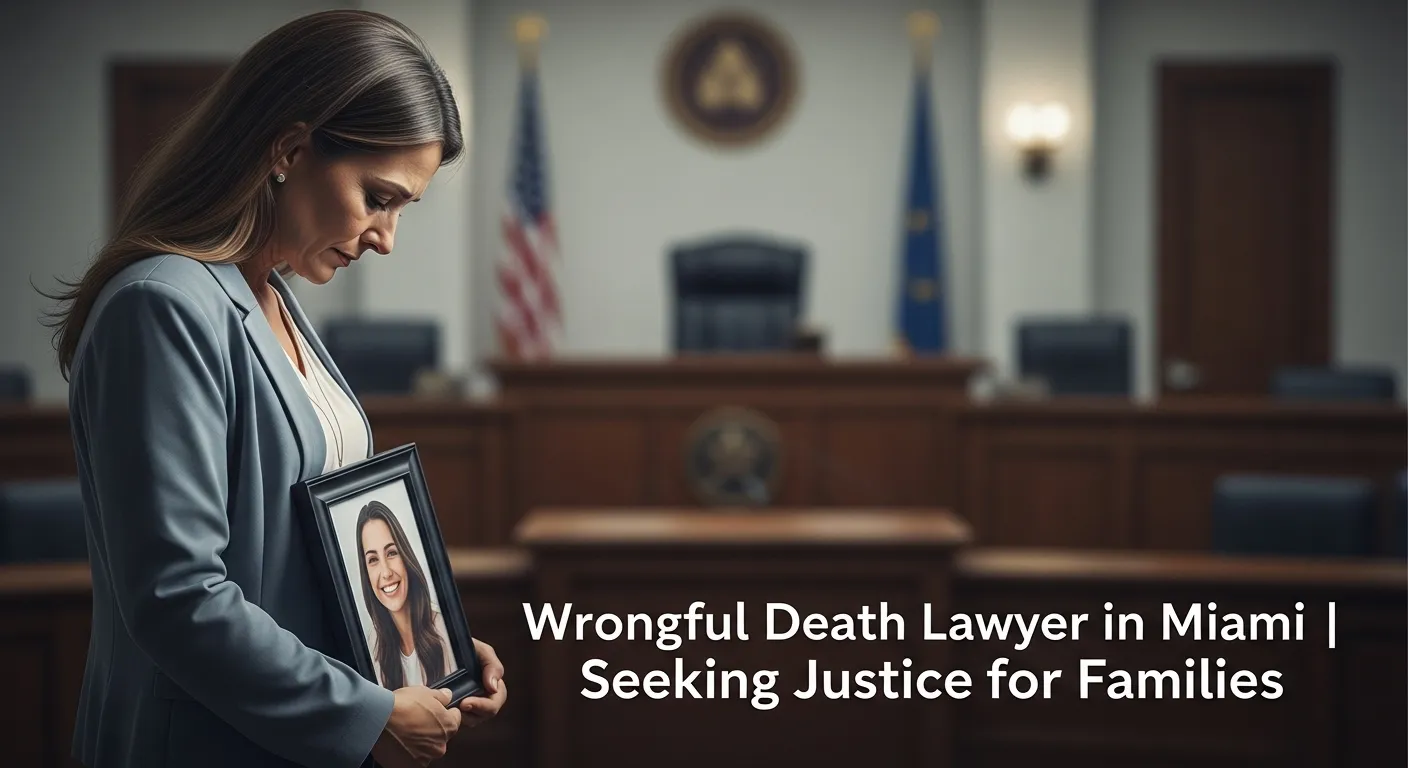A Family's Guide to Wrongful Death Lawsuits in Florida

Losing a family member is the most profound pain a person can experience. When that loss is sudden and caused by the careless or wrongful actions of another, the grief is compounded by anger, confusion, and a deep sense of injustice.
While nothing can ever replace your loved one, the law provides a way for families to seek accountability and financial stability through a wrongful death lawsuit. This legal action is not about assigning a dollar value to a life; it's about securing justice for your family and recognizing the immense losses you have suffered. This guide will compassionately walk you through what that means.
What Exactly Is a Wrongful Death Lawsuit?
A wrongful death lawsuit is a special type of civil claim filed when a person's death is caused by the legal fault of another person, company, or entity. This fault can stem from a negligent act (like a distracted driver causing a fatal crash) or an intentional one (like an assault).
It's crucial to understand that a wrongful death claim is separate from any criminal charges. A drunk driver might face criminal charges like manslaughter from the state, but the victim's family can simultaneously file a wrongful death lawsuit in civil court to seek financial compensation for their losses. The two cases proceed independently.
Who Can File a Wrongful Death Claim?
State laws strictly define who is eligible to bring a wrongful death action. While the rules vary, they typically limit this right to specific surviving family members or the representative of the deceased's estate.
Generally, the eligible parties may include:
- The Personal Representative of the Estate: This person, often named in the deceased's will or appointed by the court, files the lawsuit on behalf of the estate and its beneficiaries.
- Surviving Spouse: A husband or wife is almost always a primary beneficiary.
- Children: Both minor and adult children of the deceased typically have the right to recover damages.
- Surviving Parents: Parents of a deceased minor child, or in some cases an unmarried adult child, may be eligible to file a claim.
- Other Dependents: In some jurisdictions, other family members who were financially dependent on the deceased, such as a life partner or a dependent sibling, may have rights as well.
An experienced attorney can help your family determine who is the proper party to file the claim according to your state's specific laws.
Types of Compensation Available to Families
The financial compensation, or "damages," awarded in a wrongful death lawsuit is intended to cover the full scope of losses the family has endured due to their loved one's passing.
These damages are designed to provide financial security for the future and are generally divided into two main categories:
1. Economic Damages (Financial Losses)
These are the calculable financial contributions and costs stemming from the death.
- Loss of Support and Income: The total amount of income and benefits the deceased would have reasonably been expected to earn over their lifetime. This is often the largest component of a claim and requires economic experts to calculate accurately.
- Funeral and Burial Expenses: The reasonable costs associated with the funeral service and burial or cremation.
- Medical Bills Prior to Death: Any medical expenses incurred by the deceased as a result of their final injury or illness.
- Loss of Inheritance: The value of the assets the deceased would likely have accumulated and left to the family had they lived a full life.
- Loss of Household Services: The value of the services the deceased provided, such as childcare, home maintenance, cooking, and financial management.
2. Non-Economic Damages (Human Losses)
This compensation addresses the profound, personal, and intangible losses that have no price tag but are devastating to a family.
- Loss of Companionship, Comfort, and Guidance: This compensates family members for the loss of their loved one's presence, love, society, affection, and guidance (especially for surviving children).
- Mental and Emotional Anguish: The grief, sorrow, and mental suffering endured by the surviving family members.
- Loss of Consortium: A claim specifically for the surviving spouse for the loss of the marital relationship.

How a Wrongful Death Attorney Can Help Your Family
During a time of overwhelming grief, navigating the legal system is the last thing your family should have to worry about. An experienced and compassionate wrongful death lawyer handles the entire legal burden, allowing you to focus on healing.
We will:
- Provide a Compassionate Consultation: We listen to your story, explain your rights, and answer your questions with no obligation.
- Conduct an Immediate and Thorough Investigation: We move quickly to preserve evidence, interview witnesses, and determine exactly how your loved one's death occurred.
- Identify All Responsible Parties: We work to hold every negligent party accountable, whether it's a person, a corporation, or a government entity.
- Hire Leading Experts: We work with economists, vocational experts, and accident reconstructionists to build the strongest possible case and prove the full value of your family's loss.
- Handle All Communications: We take over all calls and negotiations with insurance companies, protecting you from their tactics.
- Fight for Justice: We will aggressively pursue a full and fair settlement or take your case to trial to demand justice for your loved one.
Frequently Asked Questions
Who can file a wrongful death lawsuit in Florida?
In Florida, a wrongful death lawsuit must be filed by the personal representative of the deceased person's estate. This representative then claims damages on behalf of the surviving family members (like a spouse, children, or parents) and the estate itself.
What is the time limit for filing a wrongful death claim in Miami?
The statute of limitations for filing a wrongful death lawsuit in Florida is generally two years from the date of the death. It is absolutely critical to contact an attorney well before this deadline, as missing it will permanently bar your family from seeking justice.
Let Us Be Your Voice for Justice.
We know that no lawsuit can bring back your loved one. But we believe that holding negligent parties accountable can provide a sense of justice and the financial security your family needs to move forward. Let our compassionate wrongful death lawyers handle the fight while you focus on your family.
Schedule a Free, Confidential Consultation →You Pay No Fees Unless We Recover Compensation for Your Family.